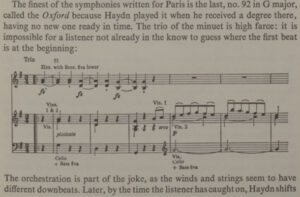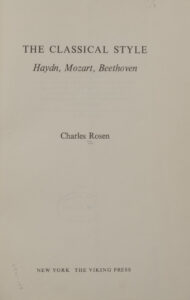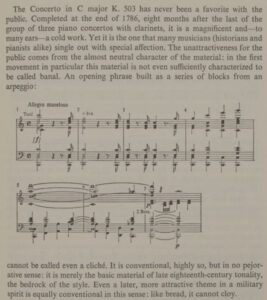Charles Rosen’s The Classical Style won the 1972 National Book Award in Arts and Letters. It has since become a standard text – perhaps the definitive text – on the three great masters of the classical style, as well as on the style itself.
Rosen is remarkable both for his erudition and for the clarity and elegance of his writing. But he didn’t begin his career authoring book-length works.
For Rosen isn’t just an important scholar. He’s also a celebrated pianist – he completed his studies at Juilliard at the age of eleven. He earned his writing chops by preparing liner notes to accompany his own highly-regarded recordings of piano works by Liszt, Haydn, Beethoven, Schoenberg, Carter, and others.

Had he confined his activities to either pursuit – scholarship or performance – he would easily have achieved distinction in the field. But Charles Rosen is that rare individual who’s excelled in two distinct, if related, realms. At the age of 84 he continues to enthrall large audiences when he does both at once: in May of 2011, for example, he’ll give a lecture in London on “The Romantic Revolution,” which will be paired with a performance (by Rosen) devoted to works by Chopin.
He’s written several other well-received works on music and musicians, including his landmark The Sonata Form, but The Classical Style remains his most important book. Significantly, this is a serious scholarly work that’s read not only by academics but by working musicians as well.
Had neither writing nor performing worked out for Charles Rosen, he had yet a third career to fall back on. His Princeton Ph.D. was in Romance languages, and in an April 2011 interview with The Guardian, Rosen recalled that
I could have stayed on as an academic, but I never intended to do anything but play the piano. The only time I taught was when my playing would only support me for half a year … So I taught French at MIT Monday to Wednesday, [and] Thursday through Sunday I was a pianist. In 1955, after two years [at MIT], I got an offer from Columbia Artist Management [to make recordings] and so I resigned.
In fact while he was at the Institute, he headed the pioneering “Humanities in French” program. So add Charles Rosen’s name to that long list of polymaths who’ve passed through the halls of MIT.


